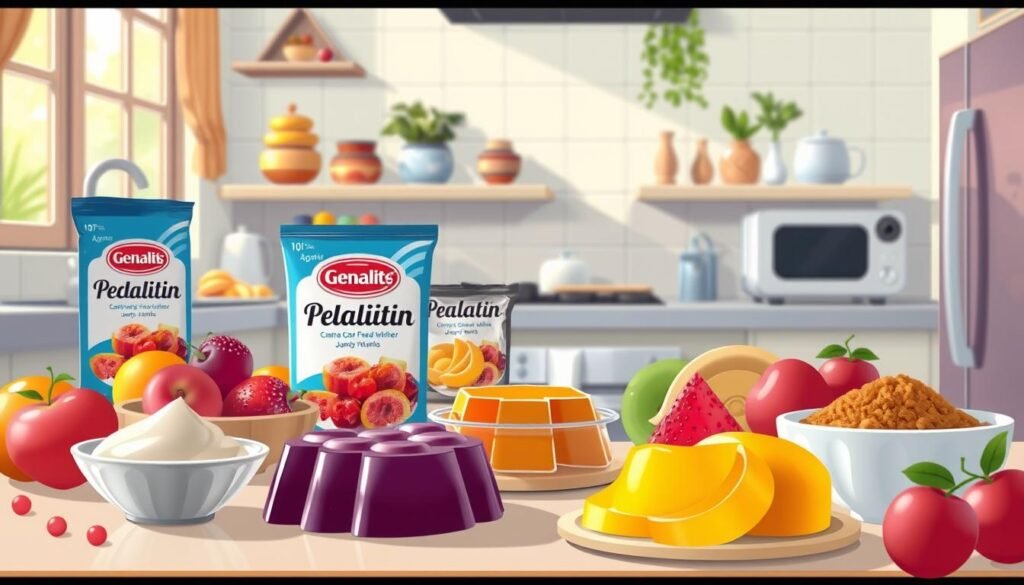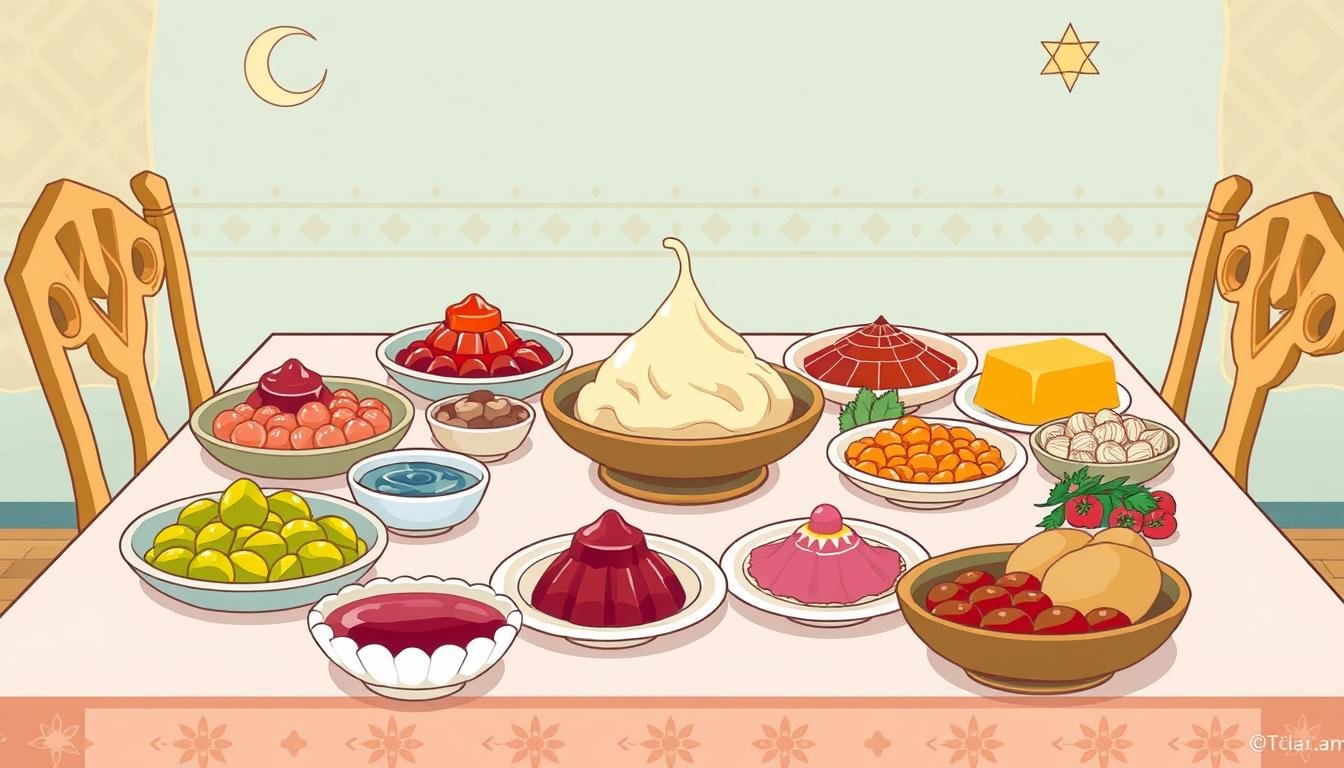Is a common ingredient in our favorite treats a challenge to Islamic dietary laws? I often think about this when I enjoy sweets and snacks. Gelatin is something we all eat, but do we really know where it comes from?
We will look into gelatin’s origins and the debate about whether it’s halal or haram. There are many opinions in our communities. How can we choose what’s right for our health and faith? Let’s explore gelatin together and find out what we might not know.
Understanding Gelatin: What Is It?
Gelatin is made by boiling animal bones, connective tissues, and skins. This makes it brittle, colorless, and flavorless. It’s created when collagen, a key protein, is partially broken down.
This gelatin is very important in the food world. It helps make foods jelly-like, like in desserts and candies.
Definition and Properties
Gelatin is not just for food. It’s also used in medicine, cosmetics, and photography. It comes from animals like cows and fish.
But, where gelatin comes from matters a lot. Gelatin from cows, camels, and sheep is okay for Muslims to eat. But gelatin from pigs is not allowed because of Islamic rules.
Knowing about gelatin helps us make better choices. It’s important to check if gelatin is halal. Labels with “halal” or “vegetarian” logos help us choose the right food.
Types of Gelatin and Their Sources
Gelatin is used in many foods and medicines. It comes from animals or plants. Knowing the different types helps us make better food choices, like choosing halal options.
Common Gelatin Sources
Pork gelatin is the most used in food. It’s cheap because it comes from pig skins and bones. But, it’s a problem for Muslims because pigs are forbidden.
Bovine gelatin comes from cattle bones and hides. It might be okay for Muslims if the animals were killed the right way. But, it costs more than pork gelatin.
Fish gelatin is made from fish skins and bones. It can be halal if the fish is allowed. But, it’s hard to find and expensive.
Some places use gelatin from poultry waste as a halal option. It’s a new idea but shows promise.
Vegetarian options like agar-agar or cornstarch are popular. They’re good for vegetarians and follow halal rules. It’s important for Muslims to look for halal labels on products.
Can Muslims Eat Gelatin? A Halal Perspective
Many Muslims wonder if they can eat gelatin. It all depends on where it comes from. Gelatin from pigs is not allowed, so Muslims should stay away from it.
Gelatin can also come from cattle and fish. But, it must be made from animals that were killed the right way. This is important for Muslims.
Type A gelatin, made from pig skins, is not okay for Muslims. But, Type B gelatin, from cattle and fish, might be okay if it’s made right. It’s important to know where gelatin comes from.
In places like Malaysia and Indonesia, they make sure gelatin is labeled as halal. This helps Muslims make safe choices.
If you’re not sure if gelatin is halal, it’s best to avoid it. This rule helps keep the Muslim community safe and united. It also lets them enjoy different foods while following their beliefs.

Halal vs. Haram: The Basics of Islamic Dietary Laws
In Islam, there’s a big difference between halal and haram food. Halal food comes from allowed sources and is made the right way. The Quran tells us what’s okay to eat and what’s not.
It says no to eating animals that have died on their own, blood, and pig meat. This is in Quran 2:173. It shows us what foods are good to eat.
Drinking alcohol is also a big no-no. Quran 5:90 says so. It’s all about keeping our minds clear and our lives pure.
Meat must be slaughtered the right way to be halal. This is called Zabiha. Animals must be prayed for before they are killed. If not, the meat is haram.
This shows the importance of following Islamic rules in our daily lives. It’s not just about food, but also about our beliefs.
Knowing these rules helps Muslims make good choices. They must check if products like gelatin are okay. For more on how to live a healthy life, check out this link.
What Makes Gelatin Halal or Haram?
The halal status of gelatin depends on its origins and how it’s made. Knowing these details is key for Muslims to make good choices.
Gelatin’s source is very important. Gelatin from animals like cattle, slaughtered the right way, is okay. But gelatin from pigs is not. Type B gelatin can be tricky because it might come from animals not killed the Islamic way.
How gelatin is made is also a big deal. Most halal gelatin comes from cattle bones and hides. It goes through a complex process that can take a few steps. This makes sure it meets halal rules.
Fish-skin gelatin can also be halal, if it comes from the right fish and is clean. If you’re not sure about gelatin, remember it’s halal unless proven wrong. Countries like Malaysia and Indonesia make sure all gelatin meets halal standards.
Transformation: The Concept of Istihalah
Istihalah is key to understanding how substances like gelatin fit into Islamic law. It lets us see if items changed a lot can be okay to eat. For example, some think gelatin from forbidden sources might be okay if it’s changed enough.
There’s a big debate among Muslim scholars about Istihalah. They wonder if a changed substance is really changed. This question is important because it helps decide what’s okay to eat. It also shows how important it is to have halal food, as more Muslims want it.

Risks of Consuming Non-Halal Gelatin
It’s important to know the risks of haram gelatin. These risks include spiritual and health problems. Gelatin from animals like pigs is often in many products.
This can make Muslims feel uneasy. They follow strict dietary laws. These laws are key to their faith.
Eating gelatin from non-halal sources can also harm your health. Some studies link it to health issues. People worry that even processed gelatin might not be safe.
Experts disagree on how safe gelatin is. This makes choosing what to eat very hard. It’s a big issue in the Muslim community.
Muslims need to find safe alternatives. There are more halal products available now. It’s important to follow dietary laws to stay healthy and true to their faith.
Animal Sources of Gelatin: A Deeper Look
Gelatin is found in many foods and medicines. It mainly comes from animals, like pigs and cows. For Muslims, it’s important to know where gelatin comes from because pigs are not allowed.
Beef gelatin is a good choice if it’s from cows killed the right way. It’s important to check if it has the right halal certification. This ensures it meets Muslim dietary rules.
Fish gelatin is also an option, but only from certain fish. It’s made by soaking fish skins in acid. Knowing these facts helps people choose what they eat.
Vegetarian and Alternative Gelatin Options
People who want to avoid animal gelatin have found new options. Agar-agar, a seaweed extract, is a plant-based alternative that works like traditional gelatin. Carrageenan, another seaweed product, is also versatile and follows halal rules.
Other choices include konjac, guar gum, and locust bean gum. These options meet dietary needs and solve ethical issues. But, it’s important to remember that these halal gelatin substitutes might not be the same as animal gelatin in taste and nutrition. Dr. Mian Riaz said some plant-based options might not be as good for all foods.
Vegan options are becoming more common in food. Companies like Geltor are making vegan gelatin that’s FDA-approved. This gives people more choices that fit their values, diets, or beliefs.
When picking gelatin alternatives, it’s key to find what you need. Vegetarian gelatin can make dishes tasty and follow halal rules. This makes cooking fun and inclusive for everyone.
Checking for Halal Certifications on Gelatin Products
Looking for halal certifications on gelatin products is a good way to check if they are halal. Organizations that give halal certifications follow strict rules. Knowing what halal labels look like helps people make better choices.
Many people look for halal certifications before buying gelatin products. In fact, 78% of buyers say they do this. But, 43% of gelatin products don’t show they are halal. This shows how important clear labels are.
Seeing a “certified halal” symbol makes 91% of people want to buy the product. Having a halal label makes 82% of people feel more sure about the product’s halal status. This shows how important halal certification is.
It’s important to know what’s in gelatin products. Because 46% of gelatin comes from pigs, being careful is key. Halal gelatin comes from animals killed the right way. Also, organic halal gelatin sales have gone up by 23% in the last year.
How to Make Informed Choices Regarding Gelatin
Understanding where gelatin comes from is key to making good food choices. Most gelatin comes from animals like pigs and cattle. But, halal gelatin comes from animals killed in a special way, which is important for Muslims.
Knowing how to pick the right gelatin is important. This way, we can choose foods that fit our dietary needs and keep us healthy.
The Scan Halal app is a great tool for finding halal foods. People like Yasmeen Kiswani and Abdallah Alatoom use it to check if foods are okay. It helps them stick to their beliefs when eating.
This app lets users choose how strict they want to be. It helps them make choices that match their values. It makes us think more about what we eat.
Talking to others and using reliable sources helps us learn more about food. Halal labels, like the Crescent-M logo, show a product is okay. But, we should always ask about ingredients and how they’re made.
Being curious and informed helps us make choices that are good for our health and beliefs. It makes sure our food choices are thoughtful and meaningful.
FAQ
Can Muslims eat gelatin?
What are the different types of gelatin?
How can I tell if gelatin is halal?
What does Istihalah mean in terms of gelatin?
What are the health risks of consuming haram gelatin?
What are some vegetarian alternatives to gelatin?
What should I consider when making informed choices regarding gelatin?

Embracing Faith, One Insight at a Time!
The teachings of the Quran have always guided my path. With a deep passion for Islamic knowledge, I strive to blend the wisdom of tradition with the relevance of today, making the timeless messages of Islam accessible and meaningful for everyone.
Muslim Culture Hub is my platform to share historical insights and thought-provoking articles, exploring both well-known and lesser-discussed aspects of Islamic culture and beliefs. My mission is to create an inclusive online space where everyone can learn, strengthen their faith, and connect with the profound message of Islam.
Join the journey!
May peace be upon you.








